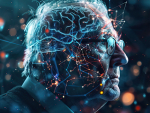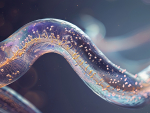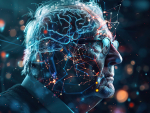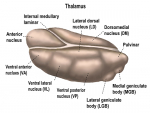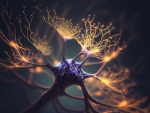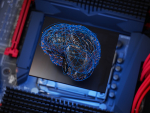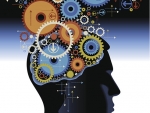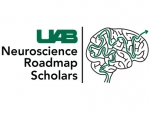Displaying items by tag: comprehensive neuroscience center
Human proteins identified that explain inter-individual differences in functional brain connectivity
This is a step toward an understanding of the brain that ultimately describes the mechanistic basis of human cognition and behavior.
Tagged under
The National Institute on Drug Abuse award is designed to stimulate innovation and potentially transformative research from early stage investigators.
Tagged under
This finding suggests that therapy to remodel synapses could help memory in old age and dementia patients.
Tagged under
Understanding the mechanisms underlying tolerance and hyperalgesia is essential to enhance morphine’s utility in chronic pain management.
Tagged under
In the mouse brain, two neural pathways were discovered: The first is active during motivation; the second is active only at the termination of motivation. In humans, these pathways could underlie motivational dysfunctions present in various psychiatric conditions.
Tagged under
Merkel cells in fingertips were known to turn mechanical force into an electrical signal, but how that signal transferred to the nerve across the synapse was unknown.
Tagged under
Rachel Smith, Ph.D., professor in the UAB School of Engineering and principal investigator in the Neural Signal Processing and Modeling lab, was recently awarded multiple grants to fund research in seizure onset localization.
Tagged under
The fields of neuroengineering and brain-computer interfaces could have a tremendous impact on a number of neurologic conditions, such as stroke, neurodegenerative disorders, Parkinson’s disease, dementia and other brain diseases.
Tagged under
Tagged under
- release
- advancement
- office of the president
- office of the provost for student and faculty success
- department of anesthesiology and perioperative medicine
- department of neurology
- department of biochemistry and molecular genetics
- department of cell developmental and integrative biology
- department of clinical and diagnostic sciences
- department of dermatology
- department of emergency medicine
- department of family and community medicine
- department of genetics
- department of medical education
- department of medicine
- department of microbiology
- department of neurobiology
- department of neurosurgery
- department of obstetrics and gynecology
- department of ophthalmology and visual sciences
- department of orthopaedic surgery
- department of otolaryngology
- department of pathology
- department of pediatrics
- department of pharmacology and toxicology
- department of physical medicine and rehabilitation
- department of psychiatry and behavioral neurobiology
- department of radiation oncology
- department of radiology
- department of surgery
- division of academic general pediatrics
- division of acute care surgery
- division of adolescent medicine
- division of advanced medical imaging
- division of anatomic pathology
- division of cardiothoracic surgery
- division of cardiothoracic anesthesia
- division of child abuse pediatrics
- division of clinical immunology and rheumatology
- division of community anesthesia
- division of diagnostic radiology
- division of developmental and behavioral pediatrics
- division of forensic pathology
- division of gastroenterology and hepatology
- division of gastrointestinal surgery
- division of general internal medicine
- division of general pediatrics and adolescent medicine
- division of genomics and bioinformatics
- division of gerontology geriatrics and palliative care
- division of gynecologic oncology
- division of hematology and oncology
- division of infectious diseases
- division of informatics
- division of laboratory medicine
- division of maternal fetal medicine
- division of molecular and translational biomedicine
- division of molecular imaging and therapeutics
- division of multispecialty anesthesia
- division of neonatology
- division of nephrology
- division of neuro oncology
- division of neuropathology
- division of pain medicine
- division of pediatric allergy and immunology
- division of pediatric hematology oncology
- division of pediatric cardiology
- division of pediatric critical care medicine
- division of pediatric dermatology
- division of pediatric emergency medicine
- division of pediatric endocrinology
- division of pediatric gastroenterology
- division of pediatric hospital medicine
- division of pediatric infectious diseases
- division of pediatric nephrology
- division of pediatric neurology
- division of pediatric oncology
- division of pediatric optometry
- division of pediatric pulmonary and sleep medicine
- division of pediatric rehabilitation medicine
- division of pediatric rheumatology
- division of pediatric surgery
- division of plastic surgery
- division of preventive medicine
- division of pulmonary allergy and critical care medicine
- division of reproductive endocrinology and infertility
- division of surgical oncology
- division of transplantation
- division of vascular surgery and endovascular therapy
- 1917 clinic
- acute care for elders unit
- addiction recovery program
- addiction recovery scholars
- alabama genomic health initiative
- all of us research program
- autism spectrum disorders clinic at uab
- center for addiction and pain prevention and intervention
- center for aids research
- center for clinical and translational science
- center for emerging drug discovery
- center for exercise medicine
- center for free radical biology
- center for interprofessional education and simulation
- center for genomic medicine
- center for low vision rehabilitation
- center for metabolic bone disease
- center for neurodegeneration and experimental therapeutics
- center for outcomes and effectiveness research and education
- center for palliative and supportive care
- center for pediatric onset demyelinating disease
- civitan international neuroimaging laboratory
- civitan international research center
- civitan sparks clinics
- comprehensive arthritis musculoskeletal and autoimmunity center
- comprehensive cardiovascular center
- comprehensive center for healthy aging
- comprehensive diabetes center
- comprehensive neuroscience center
- comprehensive stroke center
- comprehensive transplant institute
- deep south resource center for minority aging research
- gregory fleming james cystic fibrosis research center
- epilepsy center
- heflin center for genomic sciences
- hepatorenal fibrocystic diseases core center
- department of biomedical informatics and data science
- institute for cancer outcomes and survivorship
- legacy of hope
- liver center
- lung health center
- mcknight brain institute
- minority health and health equity research center
- mucosal hiv and immunobiology center
- multiple sclerosis center
- national spinal cord injury statistical center
- nephrology research and training center
- obesity health disparities research center
- obrien center for acute kidney injury research
- pancreatobiliary disease center
- parkinsons disease information and referral center
- pediatric pulmonary center
- precision medicine institute
- primary care research collaborative
- spain rehabilitation center
- school of medicine
The University of Alabama at Birmingham’s Dr. Michelle Gray has been elected to be a member on the Scientific Board of the Hereditary Disease Foundation.
Tagged under
The list was made by a group that aspires to bolster and increase diversity across all scientific fields, promote retention through the “leaky academic pipeline,” and broaden academic and industrial awareness of diversity and inclusion.
Tagged under
- release
- neuroscience
- school of medicine
- school of public health
- college of arts and sciences
- department of chemistry
- department of neurology
- department of medicine
- department of epidemiology
- department of psychology
- department of microbiology
- department of neurobiology
- department of physics
- division of endocrinology diabetes and metabolism
- division of hematology and oncology
- comprehensive neuroscience center
- oneal comprehensive cancer center
The UAB Comprehensive Neuroscience Center welcomes new leadership in Adrienne Lahti and Lucas Pozzo-Miller.
Tagged under
Several women from across UAB's campus have been recognized for their dedication and service to the community.
Tagged under
UAB presents New Frontiers of Pain Research in the 21st Century, Oct. 14-15.
Tagged under
The ecRNAs appear to act in memory formation, and may offer a new therapeutic approach to neuropsychiatric diseases.
Tagged under
Tagged under
Researchers have proposed a model that resolves a seeming paradox in one of the most intriguing areas of the brain, exploring how immature granule cells in the dentate gyrus appear able to enhance pattern separation due to lesser synaptic connectivity than mature cells.
Tagged under
The drug inhibits the activity of a kinase enzyme called LRRK2, and it showed no pathology in rat lungs, kidneys or livers.
Tagged under
National and local experts in biomedical engineering, neuroscience and rehabilitation will gather to examine the brain-machine interface as part of the UAB Bevill Neuroscience Symposium on Feb. 27.
UAB’s new Neuroscience Roadmap Scholars Program is designed to help graduate students from underrepresented communities — racial/ethnic minorities and people with disability — succeed in a career in neuroscience.
Tagged under
